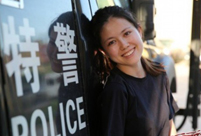 Amphibious armored vehicle unit conducts open sea drill
Amphibious armored vehicle unit conducts open sea drill
 Water relay in Henan
Water relay in Henan
 Ethnic culture feasts eyes of travelers
Ethnic culture feasts eyes of travelers
 80 security dogs assembled in Nanjing police dog training base
80 security dogs assembled in Nanjing police dog training base
 Graffiti artists paint on street walls in Xinjiang
Graffiti artists paint on street walls in Xinjiang
 Story of ceramic artist Zhang Lingyun
Story of ceramic artist Zhang Lingyun
 Magic summer night dream in Hongyuan
Magic summer night dream in Hongyuan
 Incredible creatures in headwaters drainage region of Lancang River
Incredible creatures in headwaters drainage region of Lancang River
 The future of rock n' roll seen in young rockers in China
The future of rock n' roll seen in young rockers in China
 Magnificent Yanziya Cliff
Magnificent Yanziya Cliff
Building democracy is one of the three themes of the U.S.-Africa leaders summit. Leaders from Zimbabwe, Sudan, Eritrea and Central Africa - regarded as dictators by America - were excluded from this summit.
America has its own standards for defining democracy. Before Egyptian President Hosni Mubarak was ousted, Egypt had long been an important ally of America. However, when an uprising broke out in Egypt, America abandoned Egypt because of their "dictatorship". Zimbabwe's President Robert Mugabe, a former "model of democracy" praised by America, became a 'dictator' to America when his land reform offended U.S. and U.K. interests, and the country was subjected to sanctions by the U.S. Mugabe's re-election as president last year gained widespread recognition from the international community, including some western countries. Nevertheless, Mugabe was not invited to this summit.
American academics and politicians advocate that in a democratic environment, the world can develop peacefully. Before this summit, in an interview with The Economist, leaders from U.S. said that U.S. had made great sacrifices for the cause of world peace and security. But is this the case?
America has waged frequent wars since the end of the Cold War. In the name of bringing 'democracy and freedom' to foreign peoples, and establishing new 'democratic countries', U.S. military actions have caused huge humanitarian disasters.
As is the case with gender equality, it will take a long time to realise democracy. And there are many institutional flaws in America's own democracy. Apparently under the impression that it knows more about Africa than Africans themselves, America feels the need to interfere in Africa's democratic processes.
If America genuinely cares about the peaceful development of Africa, its government has to begin by treating Africans as equals and respecting their wishes and their right to self-determination.
The article is edited and translated from《非洲的民主,非洲自己做主》, source: People's Daily
 Beautiful policewoman in an anti-terrorism SWAT team
Beautiful policewoman in an anti-terrorism SWAT team Cute photos of little Taoist nuns and monks go viral online
Cute photos of little Taoist nuns and monks go viral online Amphibious armored vehicle unit conducts open sea drill
Amphibious armored vehicle unit conducts open sea drill A post-90s girl who takes grandma to work
A post-90s girl who takes grandma to work Beijing policewomen posters become a hit
Beijing policewomen posters become a hit Armored regiment trains on the sea
Armored regiment trains on the sea Children spend 'Father's Day' with dads at work
Children spend 'Father's Day' with dads at work 'Pan Da' appear in Shanghai World Financial Center
'Pan Da' appear in Shanghai World Financial Center Champions take selfies on podium
Champions take selfies on podium The vanishing folk skills
The vanishing folk skills Intoxicating beauty of Dali, Yunnan province
Intoxicating beauty of Dali, Yunnan province Memorable moments of Ludian earthquake
Memorable moments of Ludian earthquake Bring world together to help elephant
Bring world together to help elephant 'Building Dreams'
'Building Dreams'  Labrang Monastery
Labrang MonasteryDay|Week|Month